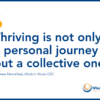 On most days you can find me at some point on a nearby hiking trail with my dog, a gray ghost named Trek. Trek is never at a lack to find something interesting to smell—a dead snake, bear scat, and a flowering cactus on our last excursion—so I’m used to him running off in search of that next aroma. When he returns, he gets treats: water, a dog biscuit, a head rub, conversation. It’s our special time together.
On most days you can find me at some point on a nearby hiking trail with my dog, a gray ghost named Trek. Trek is never at a lack to find something interesting to smell—a dead snake, bear scat, and a flowering cactus on our last excursion—so I’m used to him running off in search of that next aroma. When he returns, he gets treats: water, a dog biscuit, a head rub, conversation. It’s our special time together.
So when I came upon him yesterday with his head bowed low and nostrils wide, I wasn’t surprised at his posture. He’d obviously found a dog-loving treasure. But the so-called treasure looked to me like trash. A discarded water bottle in the middle of the trail.
Before thinking, my instinctive response was to pick it up. In my life and work, “leave things better than when you arrived” is a principle that’s always made sense. Yet my mind quickly fired off a host of faultfinding questions, “Who would litter this beautiful park?” “Why are some people so inconsiderate?” “Why should I pick up the trash if other people don’t care?”
And there you have it. That moment. The moment that instead of responding effortlessly, the jump-to-conclusions, hypercritical part of my mind kicked in.
Yes, operating from a reactive mind is ingrained in our human experience; I have compassion for this aspect of our nature. But I can also assure you, functioning this way does not engender a felt sense of ease. In fact, when it comes to truly well being, I believe learning to shift from reactivity to peace is perhaps one of the most pivotal, in-the-moment, internal shifts we can make.
I recently listened to Swami Sankarananda talk about this pivot. After many years as a hard-driving, high-flying businessman with a “nothing is ever enough” attitude, small cracks in the façade of his life became huge fissures. He got in touch with a deep discontentment he felt for the lifestyle he’d created and, after many personal crises, gave it all up in a quest to know the true nature of the world and him self. A few years ago, his journey even took him on a 10,000 mile walking pilgrimage for the humble cause of reminding people: each of us has access to an inner peace. It is available to all. (You can download insights from his entire walk here.)
Swami Sankarananda learned that pivoting from reactivity to wellbeing is life-changing yet astonishingly simple: When ruled by our little self, we suffer. When we allow our larger self to rule us, we find ourselves innately well. And when we’re well from the inside out rather than seeking it from the outside in, our natural response to our circumstances is wellbeing for all.
Said in other words, our reactivity grows on itself affecting our lives and the lives of others. Yet, so too do our happiness, generosity and loving-kindness.
If shifting from reactivity to wellbeing is that simple, why don’t we take this route more often? How can we learn to tap into our innate, effortlessness sense of goodness before our kneejerk reactions start calling the shots? We won’t all be prompted to walk 10,000 miles. But that doesn’t matter. We have at least 10,000 moments—the next team meeting, conversation with a colleague, meal with loved ones—in which to pivot from reactivity to wellbeing every day.
A good moment for me to practice? As Trek and I set out on our next hike, I’ll (happily!) just pick up the trash.
To learn about the transformational leadership programs, coaching, and culture change services at Wisdom Works, please contact me at renee@wisdom-works.com.
READ MORE
- What Do Rebellion, Transformation, And Wellbeing Have In Common?
- The Existential Fuel Of Leadership? A Meaningful Purpose
- How To Grow Wellbeing Globally? Ask CEO Patricia Foley-Hinnen
- The Lonely Leader: Longing For Belonging
- The Path Of The Evolving Leader: Leadership As Practice
- Is The Planet Ready For A Different Way Of Leading?
- Ready To Boost Leader Effectiveness And Wisdom? Try Mindfulness!
- Leading From Authenticity: Boosting Your Energy, Impact, and Wellbeing
- Wellbeing Leadership: Where Are YOU On This Journey?






